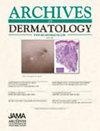Quality of Life in Women with Alopecia
引用次数: 0
Abstract
Hair loss is a psychologically devastating disorder, causing grave distress to patients of all ages, genders, and nationalities. Due to the visible nature of hair loss, individuals become increasingly self-conscious, and over time may develop anxiety or depression [1]. Furthermore, the psychological stress related to alopecia can impair functioning in social and professional arenas, affecting relationships and creating work related problems [1]. Despite the available treatments for alopecia, their efficacy is not well established and following disease course and treatment success relies on patient perception [2]. Quality of life (QoL) studies are a valuable tool in assessing patient well-being, coping mechanisms, and disease burden on patients’ activities of daily living, as well as effects of therapy [2,3].脱发妇女的生活质量
脱发是一种心理上毁灭性的疾病,对所有年龄、性别和国籍的患者都造成了严重的痛苦。由于脱发的可见性,个体变得越来越自我意识,随着时间的推移可能会产生焦虑或抑郁[1]。此外,与脱发相关的心理压力会损害社交和专业领域的功能,影响人际关系并产生与工作相关的问题[1]。尽管已有治疗脱发的方法,但其疗效尚不明确,后续病程和治疗成功与否取决于患者的感知[2]。生活质量(QoL)研究是评估患者幸福感、应对机制、疾病对患者日常生活活动的负担以及治疗效果的重要工具[2,3]。
本文章由计算机程序翻译,如有差异,请以英文原文为准。
求助全文
约1分钟内获得全文
求助全文

 求助内容:
求助内容: 应助结果提醒方式:
应助结果提醒方式:


